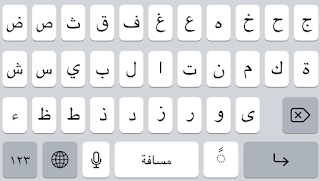About a month ago I was getting very frustrated with my
Arabic progress. I didn’t feel like I was getting better, I couldn’t figure out
how to form sentences, I wasn’t confident in what dialect to use, and I just
overall didn’t like the way things were going. About the only thing I had going
for me was that I could recognize almost all the letters in all their forms. In
all honesty, I wanted to learn, I just didn’t know how. I feel that Arabic is one of the most beautiful languages to listen to and I wanted to be
able to understand what I was listening to; I just couldn’t figure out how to go about progressing.
A lot of times when I get frustrated with Arabic I start to
doubt myself. Maybe Arabic is just too hard for me to learn by myself? I have
considered giving up countless times and just focusing on Mandarin. I have a
good thing going with Mandarin; why not focus on that and come back to Arabic
in a few years? Mandarin is more fun
because I can use it. Most situations that come up in my day, I can talk about
in some way or another.
Recently, I found a school in China that I could attend that is a full immersion school. This would allow me to improve my Mandarin while living in the country, using it to explore, learn, grow, etc. But is this what I want? Do I want to spend money to be taught how to use a language or do I want to make mistakes and learn from personal experiences? I’ve started to plan a 10-14-day trip where I would travel through China, visiting the people that I’ve met while learning this language and seeing their cities. Sure, this school would be easier to coordinate the experience, but would I be able to make it my own? For now, I’m putting it on a back burner.
One thing that has kept me going is this blog. I can't just give up on something so quickly, what would I really be proving with that? At times I feel embarrassed that I'm struggling because I wanted to be able to show everyone that anybody can learn a language. What instead I'm hoping this shows is that, yes, it is hard, you will have bad days, you will doubt yourself, you will think of giving up, but you are not alone. I hope this will show you that even with any success I've had it hasn't been an easy path. I hope you realize that if you are trying to do the same thing and feel confused, I've been there as well. I can tell you from experience that it does get better, it does get easier, and it does get a lot more fun once you can really start to use a language. So thank you for taking the time to read this. Knowing that wherever you are, you are watching what I'm doing, has given me motivation to not give up and to help keep this journey going. I couldn't do it without you.
This week has given me some optimism. I’ve finally started learning more of a dialect than the Modern Standard Arabic (MSA) because nobody speaks using MSA. I found some videos that go through some simple phrases in Egyptian Arabic and have started to repeat those phrases to myself more and more each day. I’m feeling better that I can say those without too much trouble. Not only have I started to focus on a few videos, I also watched a few other people speaking Arabic and I recognized more than I thought I would. I figured I would catch the first two sentences and that would be it, but I could follow for almost a minute!
Even more exciting for me was trying to pick up random words further into the dialogue. Sometimes when taking on a new challenge the easiest part may not be at the beginning. This could be why, using my triathlon experience, you learn to ride a bicycle before you attempt a flying mount. When learning a new song, you might start at a portion in the middle of the song that is simpler than just the beginning. For languages, you can’t always start with the first word and begin learning that word before moving further on. I was so excited while listening to somebody speak Arabic when suddenly I recognized the word for “film” which I hadn’t practiced for a month or so. Sure, I didn’t catch the whole sentence but by knowing a few words within a sentence you can piece together the meaning of the whole.
 |
| When you have two hours between flights, you be productive! |




